Write Us
We are just a call away
[ LET’S TALK AI ]
X
Discover AI-
Powered Solutions
Get ready to explore cutting-edge AI technologies that can transform your workflow!

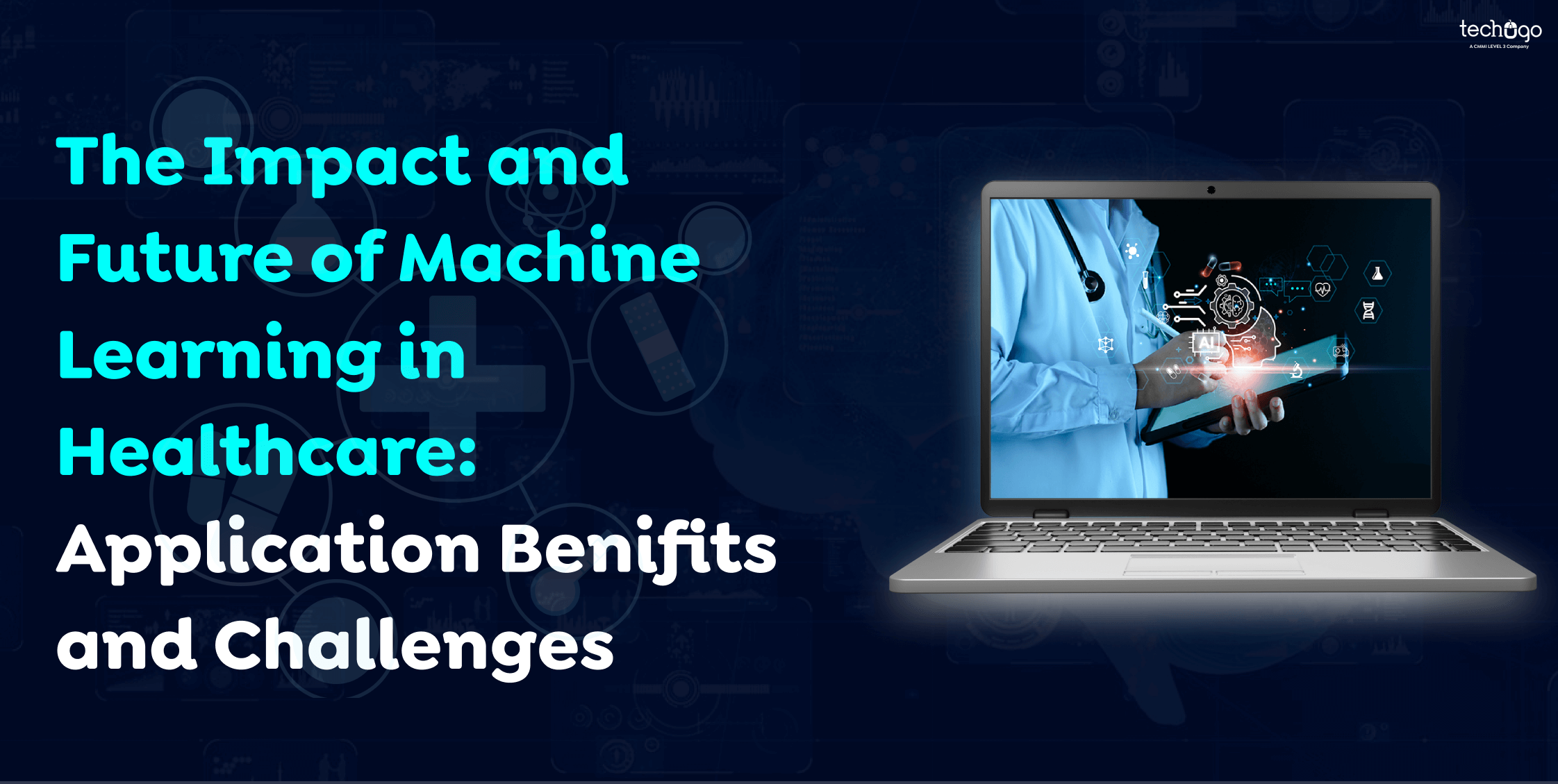
Healthcare has long been at the forefront of adopting technological innovations, and COVID-19 has further spurred this adoption by pushing industries across sectors to adopt these innovations. Be they advance in clinical procedures, drug production, and distribution, surgical medical aid delivery, or data management.
Machine learning is an AI that utilizes available data processing information to enhance efficiency and increase effectiveness. Recently, its use within medicine has seen tremendous gains and is being leveraged as an efficient solution to many complex or lengthy tasks. Health companies and medical practices have begun realizing how powerful machine learning is for improving decision quality while decreasing risks in medicine. It has opened many exciting career possibilities.
This blog will explore the impact of machine learning in healthcare, including its applications, use cases, challenges, and benefits. Furthermore, we’ll show how you can integrate machine learning within existing applications or create powerful applications dedicated explicitly to machine learning to take full advantage of its emergence.
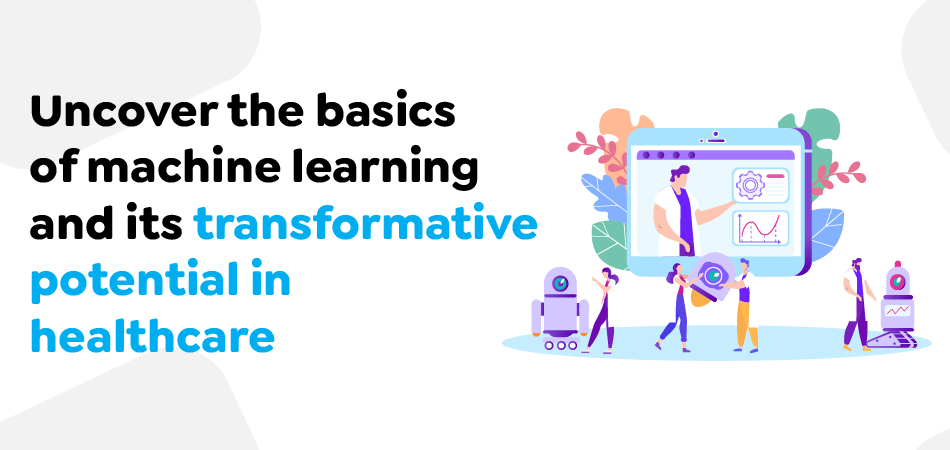
Machine learning is artificial intelligence that can help systems analyze data and identify patterns with minimal human involvement. Instead of being instructed on how to behave, computers using machine learning are shown patterns and information that allow them to conclude independently. Machine learning algorithms perform many functions, such as helping filter emails and images, recognize objects, and analyze huge volumes of ever-growing data sets. Computers employ machine learning techniques to scan emails and detect spam, recognize objects in images, and analyze large amounts of information.
Healthcare machine learning is one of the fastest-growing areas of study in precision medicine, with many potential applications. As patient data becomes easier and more accessible, machine learning in healthcare will be increasingly valuable for healthcare professionals and a healthcare app to extract significance from medical data.
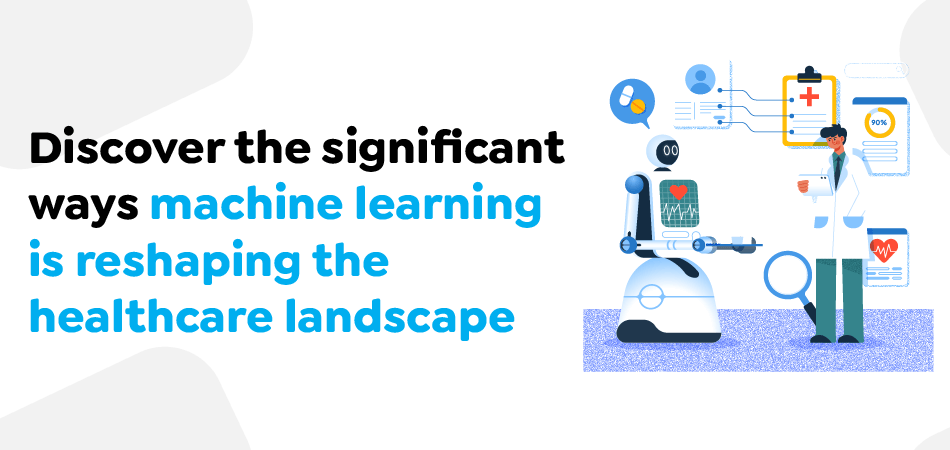
Before we begin, let’s look at how to apply machine learning to healthcare.
The classification process involves breaking down the information into different groups to be used later. Its most common use is for medical imaging, for instance, classifying healthy cells against cancerous cells.
Machine learning systems can provide suggestions for users to use. For medical professionals, the system can be employed as a tool to assist in making clinical decisions. When a physician fills in details about a patient in an electronic medical record, the software can show comparable cases, treatments, protocols for treatment, and results.
The concept of clustering is similar to that of classification. It can also group similar data but does not assign a particular label. This method is commonly utilized for different types of research in medicine, including sifting through medical data to identify new drugs.
Artificial intelligence can provide reliable predictions based on historical and current information. This is more than health information. Predictions can be made on the amount of revenue from patients, the number of patients, and other metrics for business.
As the title suggests, the method is based on finding items that are not in the norm. In one way, it can help diagnose illnesses earlier by only looking at images and vital signs. In addition, it could identify unusual or abnormal customer behavior, which could indicate fraud in insurance.
Medical professionals devote two or more hours a day to working on EHRs. Nearly half are frustrated by this job. Machine learning could help automate numerous repetitive tasks, giving doctors more time with their patients. It also reduces physician burnout rates.
Also Read – Transforming Healthcare in the Skies With Air Ambulance in Dubai
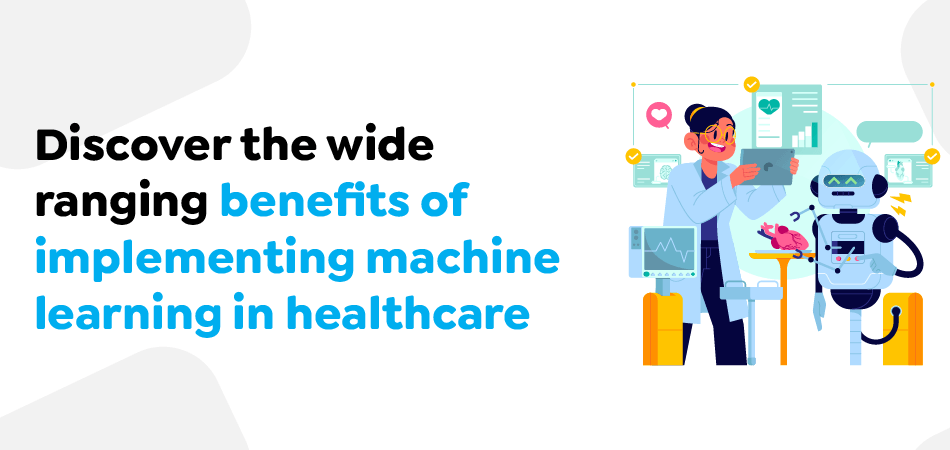
There’s a broad range of possible uses for machine learning technology in healthcare, from enhancing patient data and medical research to diagnosing and treating patients, decreasing costs, and ensuring patient health is more secure. Below is a brief list of the benefits of machine learning in healthcare:
The ML-powered software will aggregate the data your employees input, clean the data, and look for potential errors. This will help you keep your medical records current with the latest standards and create the foundation for further advantages based on a study of the information.
An ML-powered device can analyze previous outbreaks, new signs of illness, and unstructured data (e.g., news stories and social media posts) to alert you of any upcoming outbreaks before they occur. You can then prepare for them—alter staff schedules and purchase additional supplies, for instance.
The issue has been discussed before: doctors spend long hours in the EHR/EMR. Many results are obtained from entering information during a patient’s visit and analyzing the documents. Computers can interpret medical notes or identify the words used during the visit to get the necessary details. Ultimately, medical specialists can perform their tasks related to medicine, while computers handle clerical work.
This method, sometimes called “stratified” or “personalized” medicine, allows physicians to customize treatment plans for a patient’s specific needs. These modifications could include dosage and intake schedules, diet, treatment procedures, exercise routines, etc. This method can be improved with machine learning. By gathering as much pertinent information as they can and then analyzing the data. Hospitals can aid doctors in treating every patient according to their circumstances, not just based on the general trends of the population or demographics.
The machines are currently on par with doctors on the human side (albeit with some caveats) regarding diagnosing specific illnesses. The algorithms that are currently in use can determine biomarkers for disease in blood samples, detect pigmentary cancers, and identify colorectal cancer using images, and the list continues to expand. It’s a highly developed and effective machine-learning application for healthcare projects. Hospitals that require medical software development frequently include it in their specifications.
Machine learning can significantly improve drug testing. ML can identify those most suitable to participate in trials, improve adherence and retention, and thoroughly analyze findings. The most advanced algorithms can identify data not explicitly mentioned by patients by studying clues in their medical records.
They aren’t able to perform actions by themselves. However, there are numerous instances where they aid humans in accomplishing this work. They may suture tiny blood vessels, as scrub nurses extract hair follicles that can be used for transplantation and many more. Robots also serve as better intermediaries during surgeries that require extreme precision, such as eye surgery. For this, an expertly trained medical professional controls a machine that performs the work without motion.
Applications of machine learning in healthcare extend beyond health-related problems. They can also benefit the business. ML algorithms can identify trends, analyze business information to aid in making better decisions, and automatically create data for owners and shareholders and schedules and automate the scheduling process.
Finding new drugs, testing them, and getting them into the market can be a time-consuming and costly procedure. Machine learning can assist with every step of the process, including identifying substances, synthesis and data mining, target validation, and so on. In the end, it accelerates drug development in laboratories and can help pharmaceutical companies achieve higher ROI from their research.
Also Read – How Does Prescription Discount App Shape the Healthcare Landscape?
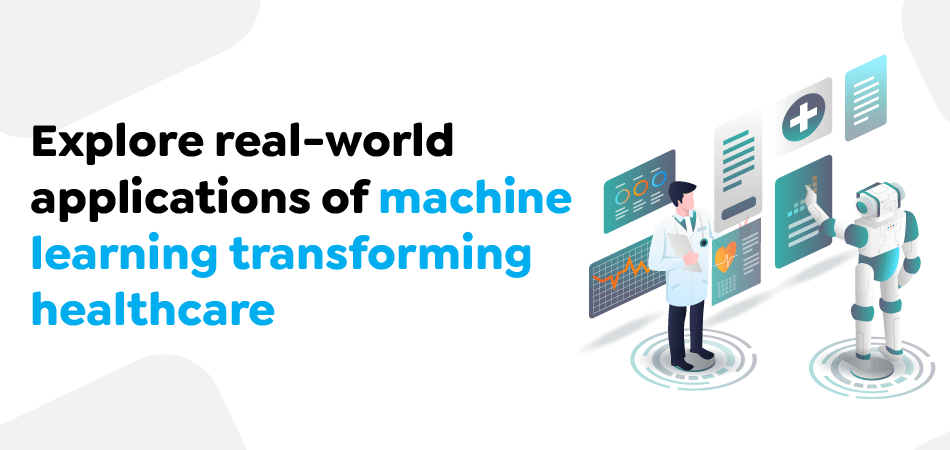
Machine learning is an advantage for healthcare professionals and patients, from maximizing hospital efficiency to making precise diagnoses. These are the most significant medical applications developed by healthcare app development company that use machine learning, transforming the field and paving the way for a better patient future.
A significant application of machine learning in healthcare is the ability to provide personalized treatment. This allows healthcare providers to offer customized treatment by studying patients’ medical histories, symptoms, and other tests. Medical professionals can utilize ML in medicine and healthcare to design specific treatments and prescribe medications targeting particular diseases of every patient. In addition, using machine learning in healthcare could assist physicians in knowing if a patient can make the needed adjustments to treatment. This helps determine the appropriate therapy from the start.
Clinical decision-support systems (CDSSs) best use medical data to aid in machine learning. These programs study the details stored in EHRs and assist doctors with providing better patient care. Research has provided ample evidence of their efficacy in cardiology and pulmonary areas. According to experts
Apart from improving patient outcomes, using a CDSS can positively impact the clinic’s cash flow. In a study after implementing the procedure, the clinic witnessed a 25% rise in patient visits. Because of improved monitoring of patients (including using information from the personal blood pressure cuffs) and diagnostic tests.
Smart record-keeping integrates data management, compliance, and performance management. It’s intrinsically linked with various other programs a business utilizes, such as EHR/EMR or PMR ERPs, scheduling software, etc. It is based on the information it provides. A sophisticated record-keeping system could also share details with third-party organizations (e.g., insurers or governments).
This software development with machine learning streamlines all associated with access to both business and patient information. In particular, it removes the possibility of duplicate data for patients, prevents billing and treatment errors, assures the authenticity of information, creates backups, and so on. Additionally, intelligent record-keeping systems can collect reports and create an audit trail, which is essential to being legally and legally compliant.
Machine learning health applications offer options for medical imaging. They assist in the analysis of X-rays and ST scans, as well as other images in 3D and 2D. This software can save a significant amount of time for pathologists, radiologists, and other specialists. Robots take only seconds to perform tasks that would typically require hours or days for humans.
Machine learning algorithms can screen for cancer and detect epileptic seizures. There are open-source examples available, too. Microsoft’s InnerEye gives the foundations for companies and researchers to develop the tools for their medical diagnostics based on pictures.
Clinical trials and research require a lot of money and time to guarantee the security and efficacy of medical treatments. There are times when the remedy must be released rapidly—for instance, COVID-19 vaccines. Machine learning in healthcare may accelerate this procedure. The algorithm can assist in determining the most appropriate sample to use in the trial, gather many more points of data, analyze the data collected from trial participants, and decrease errors based on data.
Errors with prescriptions are one of the deadliest medical errors that cause patients’ deaths on an almost regular basis. This includes prescribing the wrong medication or dose or failing to account for interactions between drugs. In the US, in particular, 77,000-9,000 people are killed each year because of mistakes in prescriptions. To prevent these medical mistakes, machines in healthcare could be the answer. Machine learning models in healthcare analyze historical EHR data and then evaluate new prescriptions with previous ones. The prescriptions not in line with the norm are flagged so doctors can review and modify them.
Also Read – Mobile Apps Enhancing Healthcare Services in the UK
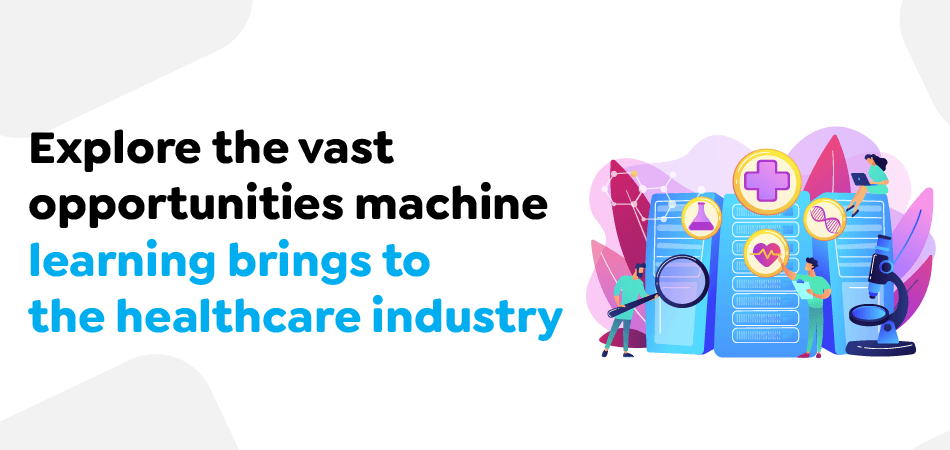
Utilizing AI and machine-learning techniques in the medical industry opens up many possibilities for the healthcare industry and Mobile App Development Company In Dubai.
In medical treatment, machine learning aids in determining disease more quickly and accelerates patient healing. Oncology is among the areas where the use of computers to diagnose is becoming more common. There are public health databases that machine learning can use to develop programs to detect breast cancer. DeepGene is a sophisticated deep neural network classifier that can accurately detect somatic mutations and other artificial neural networks (ANNs) that predict the best results from treatment.
This doesn’t mean that different areas don’t benefit from machine learning. For Parkinson’s disease diagnosis, for example, other skin conditions also draw on AI or ML. Regarding healing, AI and ML‘s primary purpose is predicting results from past data regarding the general population and a particular patient. It has been utilized for arthrology, cardiology, oncology, and many others.
Smart record-keeping is a term that integrates data management, compliance, and performance management. It’s inherently linked to various other programs a business utilizes, such as EHR/EMR and ERPs, PMRs, scheduling systems, and many more based on the information they supply. Furthermore, a well-designed record-keeping system could share data with other parties (e.g., insurance companies and government agencies).
This software streamlines all related access to business and patient data. It can also be used as a tool to reduce risk. In addition, intelligent record-keeping software can collect reports and create an audit trail, which is essential to being legally in compliance.
The most popular machine-learning applications in the medical field are research, drug discovery, and manufacturing. Pharmaceutical companies employ it to aid in finding, creating, and testing new medications faster and simpler. This data-driven method is still relatively in its early stages. Fifteen small-molecule medications developed by ML are being tested in clinical trials, and another 150 are coming. Furthermore, the trend is a massive 40% increase in annual growth.
Also Read – mhealth App Development: The Power of Healthcare and Wellness On the Go!
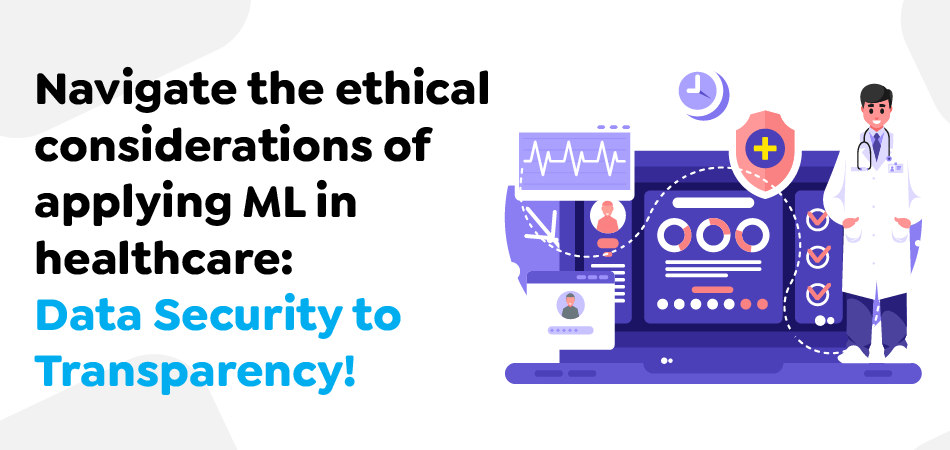
The use of machines in hospitals demands an awareness of specific ethical questions.
It is a problem that occurs frequently all over the Healthcare IT domain. Protected health information requires the highest level of security. One thing is for sure: it has the highest cost in the black market as it’s easier to communicate with an individual than other types of data. However, it’s very vulnerable and may cause severe damage to a person’s image or health. For instance, when it comes to alcohol or drug addiction, AIDS, and abortion.
To address this issue, companies must employ both organizational and technological advances strategies. These include pseudonymization, firewalls, encryption, and antivirus software. They also have access to details on a need-to-know basis (role-based access) and monitor security holes.
It is only possible to make a great knife with good steel. You can’t create an effective machine learning program with a balanced, good data collection. The word refers to the accumulation of information that can be used to develop algorithms. That means that it must cover all possible scenarios in an appropriate proportion. The data should represent the actual epidemiological state for all demographics and include enough people from every stratum to be helpful. If not, they will make mistakes.
Machine learning is a nifty technology that is usually difficult for an untrained individual to comprehend. Additionally, the particular algorithms employed by Mobile app development company in Saudi Arabia in every program differ. Therefore, physicians and patients tend to be skeptical of this “black box” that makes critical clinical choices. At a minimum, medical professionals and patients must comprehend how the ML process works to ensure patients’ informed consent and the system’s practical usage.
Also Read – Understanding the Challenges & Costs of Hiring iOS App Developers in the Middle East
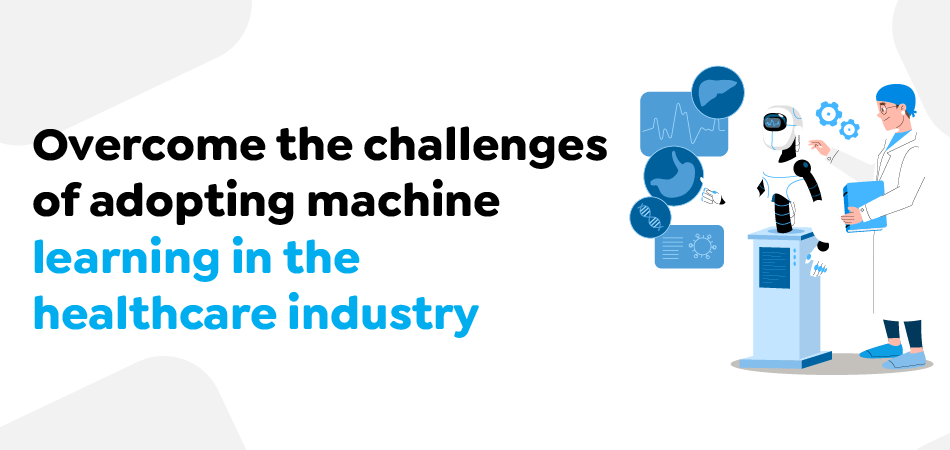
The widespread implementation of new technologies such as AI and ML has challenges. From insufficient data to patient safety, many obstacles are encountered on the path to the successful implementation of medical machine-learning techniques.
The medical information may need to be more accurate and consistent. Records are not always complete, and there are inaccuracies in profiles and other flaws. Therefore, if input data isn’t reliable or correct, there is an excellent likelihood that the outcome is also incorrect and could lead to improper treatment for patients. This can worsen their health or even lead to a patient’s death.
Machine learning algorithms, used in every industry, can be trained using large volumes of information. In the absence of proper oversight and education, the algorithms could carry and transmit biases in the data, which could result in severe negative consequences, especially in the health sector.
One of the major challenges in implementing ML in healthcare is the volume of information gathered, including sensitive or private data. This, in turn, demands additional security measures. It is, therefore, essential to choose a reliable ML or AI development firm that can provide top security solutions to ensure that your data are properly handled.
Medical ML is a severe disease, and errors can risk the patient’s life. Consider, for instance, someone came in to have a breast cancer test. The computer examines the ultrasound scans and discovers no issue; she is happy. However, the result was an untrue negative, and it is a tumor in the early stages. The earlier treatment could have given the patient a better likelihood of a successful recovery and saved her treatment cost. That means the precision of the ML algorithm has to be higher than in other areas.
Machine learning is an effective technology; however, its efficiency varies from task to task. Furthermore, its performance varies over time and between projects. The result is that predicting returns one invested in cost to develop a healthcare mobile app is nearly impossible, and the risk of implementation increases.
Also Read – What Does It Cost to Create A Text-to-Video AI Platform Like SORA?
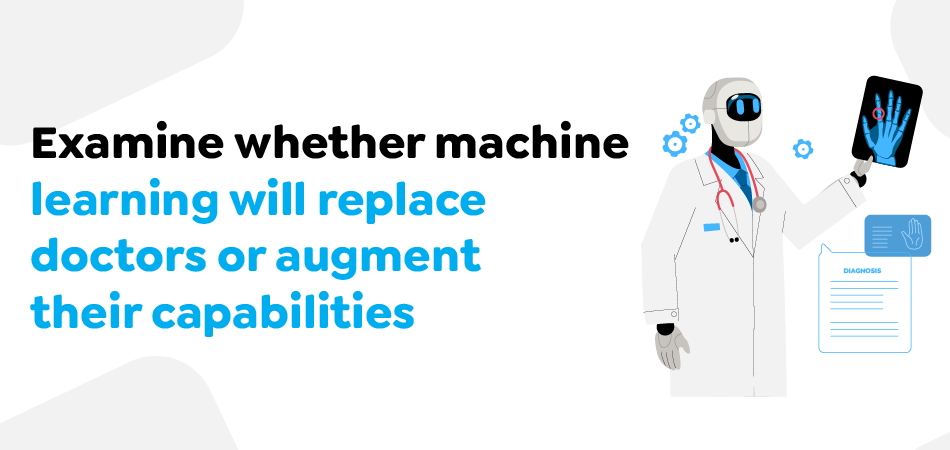
The issue of whether or not machine learning technology will take over doctors is a complex issue that focuses on the evolving relationship between medical technology and technological advancement. Machine learning in healthcare is experiencing exponential growth, with revolutionary capabilities ranging from improving diagnostic tests’ accuracy to individualized treatment plans for patients. To fully comprehend the significance of machine learning in healthcare, it’s crucial to study the functions it performs and the possibilities it has to offer.
Machine learning in telemedicine apps is not a new notion. It has been a subject of research and practice for a long time. Recent advances in computing power and the availability of data have increased the growth of ML. Machine learning in healthcare is considered a crucial device that can analyze vast volumes of data from human capabilities, identify patterns, and make predictions with astonishing precision. This has resulted in the creation of applications in medical machine learning that can diagnose illnesses from scans of images, determine the outcomes of patients, and offer treatment options.
The applications of machine learning to health are as varied as they can be impactful. For example, ML algorithms could analyze retinal images to identify diabetes retinopathy, predict heart disease risks based on electronic health records, and help diagnose cancerous tumors through imaging. The machine learning used in these healthcare examples demonstrates its potential to improve the skills of medical professionals instead of replacing their expertise.
Machine learning’s integration into medicine is principally aimed at improving the efficacy, precision, and individualization of healthcare. By handling tasks that require data using medical machine learning, doctors can concentrate more on the essential tasks of patient treatment, making decisions based on the clinician’s judgment and empathy. The complex nature of medical practices, which requires studying the patient’s history, decoding the subtle clinical signals, and looking at the social-emotional aspect of medical care, is out of today’s ML algorithms.
Although machine learning and healthcare development have many exciting opportunities, it’s unlikely to replace doctors completely. However, partnering with a leading mobile app development company in UAE can help integrate advanced technologies to enhance healthcare services. Many people are eager to know about the benefits, features, and cost to develop a mobile app for healthcare. In the meantime, machine learning in healthcare will become an essential ally in the medical industry, increasing the ability to diagnose and treat, improving patient outcomes, and allowing physicians to focus on aspects of their care that need human insights and empathy. The future of healthcare is not in the choice between medical and machine learning experts but in harnessing their strengths for a more efficient, precise, compassionate, and accurate health system.
Also Read – Decoding the Dynamics: Is RPA a part of AI?
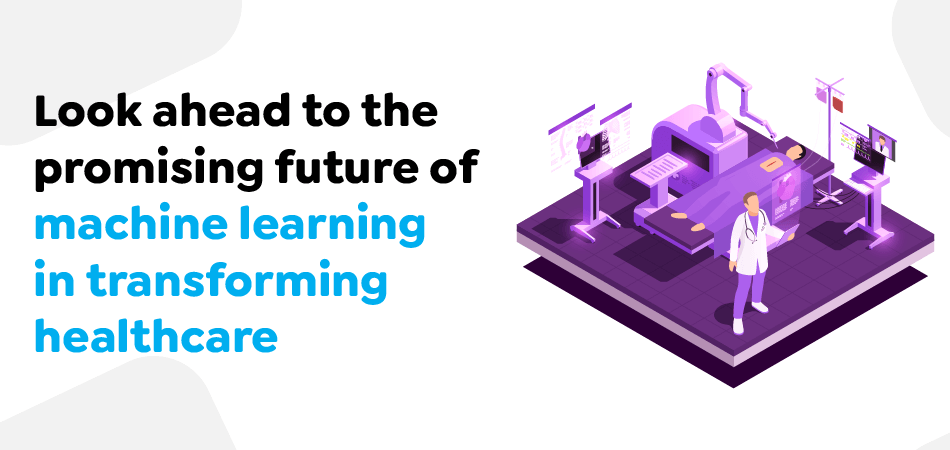
The potential of machine learning in healthcare looks promising. Despite some issues, ML helps resolve current health problems, anticipate future challenges, and prevent outbreaks worldwide. Additionally, it aids in improving the quality of care for patients, doctors’ medical practices, and pharmaceutical processes.
This latest technology analyzes hundreds of different details, customizes treatments, forecasts the effects and risks, and does a variety of other things. Machine learning and AI for healthcare can also provide earlier warnings of conditions such as seizures or sepsis that require rigorous analysis of hugely complex data.
Shortly, experts can utilize ML in combination with nanotechnology to enhance medicine delivery. Machine learning applied to the healthcare field could allow “virtual biopsies” and revolutionize radiomics. Machine learning-powered technology allows physicians to reduce the risks of surgery to minimal treatment information. Programmed robots can aid doctors in the surgical room shortly.
Using machine learning in healthcare could greatly benefit doctors, clinicians, researchers, and patients. Every day, technology makes a breakthrough, and with each breakthrough, an entirely new solution is created to solve a challenge or set a record. Machine learning’s advancement in healthcare is constantly growing. It is expected to achieve greater heights over the next few years.
Also Read – The Ultimate Guide to Hospital Inventory Management Software Development
Machine learning and healthcare are an inevitable pairing. Machine learning applications for healthcare are growing in leaps and bounds, and the health industry is closely monitoring their development. In turn, companies across the world are using AI-driven technologies and models for better healthcare delivery.
Clinics that use ML benefit from many aspects, such as improved patient outcomes and streamlined administration processes. Reduced burnout among physicians and improved the accuracy of information about their patients and health trends. Pharmaceutical firms benefit from faster and better R&D and speedier trial timeframes. Some challenges include gathering accurate information or ensuring compliance with the regulations. Overall, the benefits are far greater than the risks.
Ready to revolutionize your healthcare solutions with Techugo?
Get in touch with our experts to start your journey today!
Write Us
sales@techugo.comOr fill this form